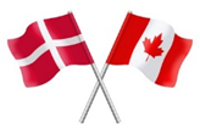Call for Applications

Canada-Denmark Arctic Research Station Early Career Scientist Exchange Program
What: An exchange program between Arctic early career scientists in Canada and Denmark
Where: The Canadian High Arctic Research Station (CHARS) campus in Cambridge Bay, Nunavut and Arctic Station in Qeqertarsuaq, Greenland
Who can apply: PhD-students or scientists holding a PhD degree not older than five years, employed by a university or research organization in Canada or Denmark
Included: Travel to each research station and accommodation are provided free of charge
Timing: 3-6 weeks at each field station; both placements in 2018, or one in 2018 and one in 2019, depending on applicant’s preference; seasonal timing (summer, fall, etc.) also based on applicant preference
Deadline to Apply: March 23, 2018
Introduction
To encourage pan-northern research collaboration and foster Canadian-Danish Arctic research cooperation, Polar Knowledge Canada (POLAR) and the Danish Agency for Science and Higher Education are offering early career scientists the opportunity to take part in an exchange program between the Canadian High Arctic Research Station (CHARS) campus in Cambridge Bay, Nunavut, and Arctic Station in Qeqertarsuaq, Greenland, owned and operated by the University of Copenhagen. Selected scientists will conduct research at both stations and establish links between Canadian and Danish Arctic research institutions.
The stations are located at similar latitudes but in different ecozones. The CHARS campus is located in an Arctic tundra ecozone, while Arctic Station on the south coast of Disko Island in central west Greenland is characterized by a low Arctic, marine climate. The two stations combined provide an opportunity for comparative studies under different climatic regimes.

The Research Stations
The CHARS campus is located in Cambridge Bay, Nunavut (69°N). The campus is a year-round world-class hub for science and technology in Canada’s North and a major node in the network of national research infrastructure across the North. The CHARS campus consists of a Main Research Building, a Field and Maintenance Building and triplex accommodation units that can accommodate 44 visiting researchers. The research campus will provide a broad range of services, including a technology development centre, mechanical and electrical workshops, a knowledge-sharing centre, and advanced laboratories. The CHARS campus will have office and laboratory space to host visitors. POLAR staff can provide general logistical support as well as equipment for scientists going into the field and working in the research labs. Cambridge Bay, with a population of approximately 1,700, has all the necessary amenities, including a bank and a post office, grocery stores, several churches, restaurants, and companies for vehicle rentals.
Arctic Station is located on the south coast of Disko Island in central west Greenland (69°N). The main building can accommodate 26 guests. There is a classroom with audio-visual equipment and a power projector, a living room, canteen and kitchen facilities. AS is located in a nature sanctuary, approximately 1 km west of a small town, Qeqertarsuaq (formerly Godhavn), with a population of 1,100. Arctic Station offers laboratories, a library building, workshop, garage and a storage hut. There is also access to the research vessel Porsild, with equipment for ocean and sediment study, coring, and study of bottom fauna and microalgae, as well as transportation to remote field sites in Disko Bay. The town contains all necessary service facilities, including several shops, bank, post office, church and a hospital. Arctic Station buildings and logistics have been continuously modernized, expanded and developed. The station therefore provides a 'state of the art' platform for year-round environmental research.
The Exchange Program
The exchange program is directed towards early career scientists with an interest in science and technology projects that align with at least one of the priorities listed in the table below. The selected candidates will conduct their proposed research projects at both research stations. Note that applicants’ projects need not align exactly with those proposed from the other country; the idea is simply that successful candidates have the opportunity to enrich their own research by conducting it in two Arctic locations, and that they potentially benefit from collaboration with another research team. Selected candidates will receive access to each station’s regular research services (laboratories, staff support, etc.), and accommodation and travel expenses will be covered to the CHARS campus and Arctic Station for both the domestic and international field work placement.
| POLAR Science and Technology Priorities |
|---|
| Alternative and renewable energy for the North |
| Improved design, construction or maintenance of northern housing or waste management infrastructure |
| Ecosystems monitoring (biotic or abiotic) |
| Predicting the impacts of changing ice, permafrost or snow on shipping, infrastructure or communities |
Timing
Field work at the stations can be conducted at any time in 2018 and 2019, according to candidate preference, as long as the first field campaign occurs in 2018. The first field work may begin as early as May 2018; both placements must be concluded by December 2019. Duration of field work placements will be 3 to 6 weeks, depending on the research being conducted and availability of facilities and accommodation.
Who Can Apply?
PhD-students, or scientists holding a PhD degree not older than five years are eligible to apply. The applicant must be employed by a university or other research organization in Canada or Denmark. Applicants from Canada must submit their applications to POLAR at info@polar.gc.ca. Applicants from Denmark must submit applications to Danish Agency for Science and Higher Education at Polarsekretariatet@ufm.dk. Applications must be submitted in English.
Applicants may identify a potential exchange partner in their applications, or may apply with a project and be matched by the host organizations with an appropriate project partner. One candidate from each nation will be selected for the 2018-19 program.
Selection Criteria
- Field work experience in the Arctic, or involvement in Arctic research
- Project alignment with one of the above science and technology priorities
- Early career scientist availability to participate in two field campaigns (one in each country)
Applications will be selected based upon:
- Willingness to include early career scientist from the other country in the project’s field campaign (if project collaboration is considered mutually beneficial)
- Experience with community engagemen
- Proposed projects that involve the community in the research process and/or science communication are strongly encouraged
- Preference will be given to northern and Indigenous applicants. However, all applicants are encouraged to apply.
Considered an asset:
Expected outcome
The program is designed to enhance science and technology knowledge, and strengthen Canadian-Danish research links in the following ways:
- Sharing of field methods and research knowledge; introduction to the other country’s research community and priorities; advancing further bilateral research collaboration and expanding collaboration networks
- Creating a channel for bilateral exchange of best practices, and potential exchange of personnel and managers at the research stations
What to include in application
The application should include:
- Completed application form
- Research plan (maximum 3 pages) containing sections on –
- Research interests Outline of research project and field work plan, and how the project will benefit from taking place at both research stations
- Research funding currently assigned, or potentially allocated, for the project
- The research team’s Arctic field experience
- Resume of the early career scientist
- A letter of support from the project leader
Applications must be received not later than March 23, 2018. Canadian applicants must submit to info@polar.gc.ca and Danish applicants to Polarsekretariatet@ufm.dk.
 Polar knowledge Canada (POLAR) is a Canadian government agency established on June 1st, 2015. POLAR’s mandate is to advance Canada’s knowledge of the Arctic and strengthen Canadian leadership in polar science and technology.
Polar knowledge Canada (POLAR) is a Canadian government agency established on June 1st, 2015. POLAR’s mandate is to advance Canada’s knowledge of the Arctic and strengthen Canadian leadership in polar science and technology.
 Danish Agency for Science and Higher Education is an agency in the Ministry of Higher Education and Science. The agency lays the foundation for development of high-quality Danish research and higher education, and works to promote good international interaction in both research and education areas.
Danish Agency for Science and Higher Education is an agency in the Ministry of Higher Education and Science. The agency lays the foundation for development of high-quality Danish research and higher education, and works to promote good international interaction in both research and education areas.